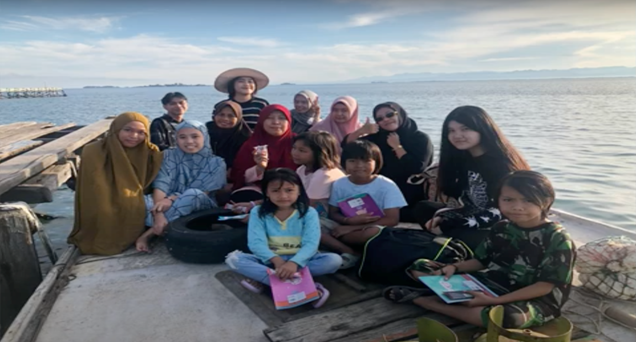Go digital MSMEs training to support women's empowerment program on Laiya Island, South Sulawesi
DOI:
https://doi.org/10.22219/jcse.v5i1.31469Keywords:
community service, digital MSMEs, family welfare, marine products, Women's empowermentAbstract
This community service activity aims to provide knowledge about the benefits of the digitalization program and the importance of empowering women to achieve gender equality and to improve people's skills in using digital systems by utilizing marine products by making and processing fish balls and learning how to package them. Community service activities were carried out on Laiya Island, Pangkep Regency, South Sulawesi Province, Indonesia from March to June 2023. This activity is divided into two stages. The first stage is digital marketing outreach and women's empowerment. At this stage, the proposing team provided material about the importance of empowering women, especially in processing marine products. We also explained the importance of empowering MSMEs by involving women on the island. In the second stage, we conducted training on the use of marine products, especially fish, as the main livelihood on this island. We teach participants how to process and package fish balls and market them online. One of the market attractions lies in digital packaging and marketing. Participants who take part in this activity generally understand how to make packaging in a simple way. At this level, participants are able to explain the importance of women's empowerment programs in supporting the improvement of community or family welfare. The results of the service increase participants' understanding and skills in online social media at the basic stage.
Downloads
References
Adolfsson, J. S., & Madsen, O. J. (2020). “Nowadays there is gender”: “Doing” global gender equality in rural Malawi. Theory and Psychology, 30(1), 56–76. https://doi.org/10.1177/0959354319879507
AsiaDevelopment. (2021). Women’s economic empowerment in Asia. ADB Institute (Vol. December). Tokyo, Japan. https://doi.org/10.18356/d45edd9d-en
AustralianGovernment. (2022). Stronger Partnerships with Women in Southeast Asia. Retrieved 5 April 2023, from https://www.dfat.gov.au/news/news/stronger-partnerships-women-southeast-asia
Bahtiar & Saragih. (2020). Dampak Covid-19 Terhadap Perlambatan Ekonomi Sektor UMKM. Kajian Singkat Terhadap Isu Aktual Dan Strategis, 12(6), 19–24. Retrieved from https://berkas.dpr.go.id/puslit/files/info_singkat/Info Singkat-XII-6-II-P3DI-Maret-2020-1982.pdf
Bui, T. T., Tran, Q. T., Alang, T., & Le, T. D. (2023). Examining the relationship between digital content marketing perceived value and brand loyalty: Insights from Vietnam. Cogent Social Sciences, 9(1). https://doi.org/10.1080/23311886.2023.2225835
Colineaux, H., Soulier, A., Lepage, B., & Kelly-Irving, M. (2022). Considering Sex and Gender in Epidemiology: a Challenge Beyond Terminology. From Conceptual Analysis to Methodological Strategies. Biology of Sex Differences, 13(1), 1–10. https://doi.org/10.1186/s13293-022-00430-6
Drew, C. (2023). All 6 Levels Of Understanding (On Bloom’s Taxonomy). Retrieved 20 May 2023, from https://helpfulprofessor.com/levels-of-understanding/
Egala, S. B., Amoah, J., Bashiru Jibril, A., Opoku, R., & Bruce, E. (2024). Digital Transformation in an Emerging Economy: Exploring Organizational Drivers. Cogent Social Sciences, 10(1). https://doi.org/10.1080/23311886.2024.2302217
Fivush, R., & Grysman, A. (2022). Narrative and Gender as Mutually Constituted Meaning-Making Systems. Memory, Mind & Media, 1, 1–14. https://doi.org/10.1017/mem.2021.4
Galiè, A., & Farnworth, C. R. (2019). Power through: A New Concept in The Empowerment discourse. Global Food Security, 21(June), 13–17. https://doi.org/10.1016/j.gfs.2019.07.001
Goetz, A. M. (2020). The politics of preserving gender inequality: de-institutionalisation and re-privatisation. Oxford Development Studies, 48(1), 2–17. https://doi.org/10.1080/13600818.2019.1672144
Halisçelik, E., & Soytas, M. A. (2019). Sustainable development from millennium 2015 to Sustainable Development Goals 2030. Sustainable Development, 27(4), 545–572. https://doi.org/10.1002/sd.1921
Koeswahyono, I., Maharani, D. P., & Liemanto, A. (2022). Legal breakthrough of the Indonesian job creation law for ease, protection, and empowerment of MSMEs during the COVID-19 pandemic. Cogent Social Sciences, 8(1). https://doi.org/10.1080/23311886.2022.2084895
Lorber, J. (2018). The Social Construction of Gender. In D. B. Grusky & J. Hill (Eds.), Inequality in the 21st Century (1st ed., pp. 347–351). New York, USA: Routledge. Retrieved from https://www.taylorfrancis.com/chapters/edit/10.4324/9780429499821-61/social-construction-gender-judith-lorber?context=ubx&refId=a023bab8-d650-401d-bb13-4ebda46f36bc
Majdawati, A., & Brahmana, I. B. (2022). The Empowerment of Health Cadres in Assisting Pregnant Women during the Covid-19 Pandemic. Jurnal Pemberdayaan: Publikasi Hasil Pengabdian Kepada Masyarakat, 6(2), 37–44.
Mazda, G. (2021). UMKM Meroket: Wujudkan SDGs 2030. Retrieved 3 April 2023, from https://tugujatim.id/umkm-meroket-wujudkan-sdgs-2030/?amp
Pemerintah Kabupaten Batu Bara. (2022). Dukung Upaya Peningkatan Literasi Digital Pelaku UMKM. Retrieved 15 March 2023, from https://batubarakab.go.id/post/dukung-upaya-peningkatan-literasi-digital-pelaku-umkm
Phillips, R. (2015). How ‘Empowerment’ May Miss Its Mark: Gender Equality Policies and How They are Understood in Women’s NGOs. International Journal of Voluntary and Nonprofit Organizations, 26, 1122–1142. Retrieved from https://link.springer.com/article/10.1007/s11266-015-9586-y
Salih, A. A., Alsalhi, L., & Abou-Moghli, A. (2024). Entrepreneurial Orientation and Digital Transformation as Drivers of High Organizational Performance: Evidence from Iraqi Private banks. Uncertain Supply Chain Management, 12(1), 9–18. https://doi.org/10.5267/j.uscm.2023.10.022
Stibbe, D., & Prescott, D. (2020). The SDG partnership guidebook : a practical guide to building high impact multi-stakeholder partnerships for the Sustainable Development Goals. Retrieved from https://sdgs.un.org/sites/default/files/2020-10/SDG Partnership Guidebook 1.01 web.pdf
Suyanto, B., Sugihartati, R., Egalita, N., Mas’udah, S., Singgih, D. S., & Sudarso. (2023). Digital Literacy and Survival Mechanism of Micro-Small Enterprises in Practicing Sharing Economy. Cogent Social Sciences, 9(2). https://doi.org/10.1080/23311886.2023.2245691
UNWomen. (2022). In focus: Sustainable Development Goal 5. https://doi.org/10.5860/choice.190794
Wasik, Z., & Handriana, T. (2023). Strategy for Sustainability of The Fishery Industry during The COVID-19 Pandemic in Indonesia. Cogent Social Sciences, 9(1). https://doi.org/10.1080/23311886.2023.2218723
Wibowo, A., Alawiyah, W., & Azriadi. (2024). The Importance of Personal Data Protection in Indonesia’s Economic Development. Cogent Social Sciences, 10(1). https://doi.org/10.1080/23311886.2024.2306751
Woodward, A. E. (2015). Travels, Triangles and Transformations Implications for New Agendas in Gender Equality Policy. Tvgn, 18(1), 5–18. Retrieved from https://www.ingentaconnect.com/contentone/aup/tgen/2015/00000018/00000001/art00002?crawler=true&mimetype=application/pdf
Yanto, H., Ismail, N., Kiswanto, K., Rahim, N. M., & Baroroh, N. (2021). The Roles of Peers and Social Media in Building Financial Literacy among The Millennial Generation: A Case of Indonesian Economics and business Students. Cogent Social Sciences, 7(1). https://doi.org/10.1080/23311886.2021.1947579

Downloads
Published
How to Cite
Issue
Section
License
Copyright (c) 2024 S. Seniwati, Ummu Atiyah, R. Rahmatia, Patrice Lumumba, Khairul Amri

This work is licensed under a Creative Commons Attribution-ShareAlike 4.0 International License.












